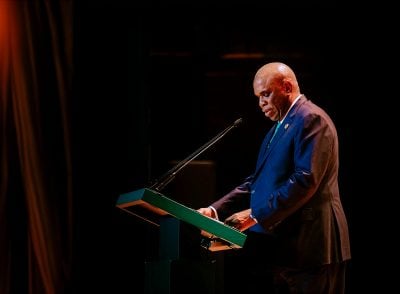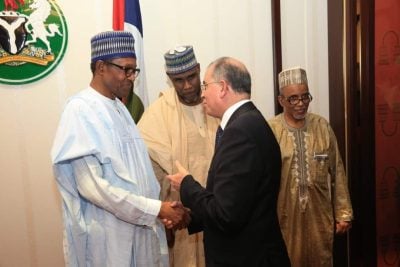
Bola Tinubu clearly felt it was best to start his time in office by making the toughest decision. As such, he immediately declared the end of fuel subsidies (a possibility avoided like the plague for eight years by his predecessor) in his inaugural speech on 29 May. Fuel prices more than doubled.
Days later, Tinubu fired Central Bank of Nigeria Governor Godwin Emefiele and made him a guest of the state security police. Following a court ruling against his detention without charge, since 10 June, Emefiele was brought to court to face accusations of economic sabotage. He denied the charges, saying he was the victim of a political witch-hunt, which is a credible claim given that he had sought the Presidency himself and Tinubu publicly accused him of trying to derail his campaign.
Next, the new president scrapped the multiple exchange-rate system maintained by Emefiele, to let the naira float, a key reform for long demanded by the World Bank and the International Monetary Fund. It was ignored by the previous government. The value of the naira plunged more than 40% as the artificial bottleneck maintained under Buhari burst.
Is the cure worth the pain?
The immediate impact of a combination of higher fuel prices and a devalued naira has been hyperinflation and a worsening of the dire economic straits that have been the lot of the average citizen in recent years.
Annual inflation of 22.79% (in June) represents a two-decade high and is set to rise further. With Nigeria heavily dependent on road transportation for the movement of goods and services (rail playing little or no part), the impact of higher fuel costs on prices was immediate. The country’s dependence on imports ensured a similar impact from the currency devaluation.
Tinubu’s government has sought to paint the tough measures as the necessary pain that must come before the gains. For a country with more than half of its population living in multidimensional poverty, the impact has been excruciating for the majority. The government felt compelled to declare a food emergency on 13 July, saying that Tinubu wasn’t “unmindful” of the hardships citizens are facing.
“While availability is not a problem, affordability has been a major issue for many Nigerians in all parts of the country,” Dele Alake, the president’s spokesman, said. “This has led to a significant drop in demand, thereby undermining the viability of the entire agriculture and food value chain.”
But all he has to offer the citizens at the moment are just promises and tokens as palliatives, given the general poor state of government finances.
According to Enough Is Enough, a civic group that monitors government spending, the N500bn ($646m) that Tinubu is seeking approval from lawmakers for disbursement as a palliative will only provide N8,000 monthly to just 12m Nigerian families for six months. The group lamented Tinubu’s decision to award N70bn to 360 lawmakers, already among the best paid in the world, ostensibly to improve their work conditions.
Tinubu was also criticised for the bad optics of arriving in Lagos with a 120-car convoy following a trip to France last month, at a time when the government was calling on citizens to make sacrifices.
Fight for legitimacy
However, some analysts see Tinubu as moving quickly to improve his reform credentials, particularly in Western capitals, as a way of improving his legitimacy given the controversial circumstances in which he was announced the winner of the February presidential election.
Two top opposition parties are challenging the results in court, while damning reports on the election were issued by European Union observers as well as independent local observers.
“There seems to be a strategy to appease Western governments so that they won’t want to see him go,” said Timi Benjamin, an Abuja-based political analyst and consultant. “But he needs to be wary of the domestic backlash.”
Others have argued that he had no options left. Nigeria’s policy to subsidise fuel goes back to the 1970s oil-boom when officials decided that the citizens should feel the benefit of the country’s main export. While successive governments reduced the size of the subsidy over the years, none scrapped it entirely, until now.
Over the years it became a major conduit of corruption and patronage, overseen by the state-owned oil company. Under immediate past President Muhammadu Buhari, it bloated up to the extent that it was taking up more than a third of the national budget. Faced with the prospect of ending the subsidy in an election year due to poor government finances, Buhari instead raised $1.3bn in Eurobonds to maintain it.
With the country already under a heavy debt burden, Tinubu’s predecessor left him with a limited scope for borrowing. Buhari’s accession to office in 2015 coincided with a global collapse in the price of crude oil, Nigeria’s main export and leading source of foreign exchange.
A failure to resolve outstanding grievances led the renewed attacks on oil facilities by militants in the Niger Delta region, home to the country’s oil and gas industry.
As oil prices fell and output collapsed, Nigeria was pushed into its first recession in a quarter-century. A second recession was triggered by the coronavirus pandemic lockdown in 2020.
With oil output never quite recovering during his two terms as president, Buhari largely relied on domestic and foreign borrowing to fund government spending. Public debt figures as he left office were over four times higher than the N12trn when he came to power.
Policies find support in some quarters
Tinubu’s attempt to tackle the problems he inherited head on appears to have yielded some positive results. For one, it has been welcomed by the World Bank and the IMF as well as in the Western capitals. The markets have also welcomed the steps taken by the new government, with Nigerian Eurobonds making gains.
Even the stock market appears to have heaved a sigh of relief, with foreign portfolio investors that sat out the Buhari years on the fence, now flocking back.
Despite the absence of foreign investors, the Nigerian stock market had defied gravity in the past year as local investors avoiding low rates in the money market took advantage of cheap valuations.
As at 14 July, it had gained 19.83% from the start of the year on the back of stocks such as mobile phone company MTN Nigeria, Transcorp Hotels, Seplat Energy, and a host of banking stocks led by Stanbic IBTC, Access Bank and First Bank. The market appears set for a long bull run.
Despite his efforts to hit the ground running, Tinubu still has to cast glances behind his back with the possibility that his Presidency could yet be nullified by the courts on the basis of the petition filed by his challengers.
Privately, officials of the ruling All Progressives Congress (APC) are preparing themselves for a rerun, while hoping the courts ultimately lean on the side of their administration.
If Tinubu survives the courts, one can expect the full unfurling of his political and economic agenda. For both, he will need to regain control of the country’s oil wells from corrupt officials who prefer illegal sales for self-enrichment while leaving the Treasury dry.
Currently, Nigeria pumps less than 1m barrels of oil daily, but will be able to balance its budget with output above 2m barrels per day. Increasing the country’s oil exports will not only boost Nigeria’s balance of payments, it will also give strength to the naira with improved foreign-exchange flows, while providing the revenue needed for infrastructural investments and economic diversification to reduce the country’s oil dependence.
Revisiting the old playbook?
Some observers believe that Tinubu, essentially, bears responsibility for Buhari’s awful governance record, for being the one person who enabled Buhari’s emergence. This happened with the 2014 merger of the Action Congress of Nigeria, effectively led by Tinubu, and the Congress of Progressive Change led by Buhari.
It was a marriage of convenience. While Buhari’s faction represented the ultra-conservative wing of the country’s northern Muslim establishment, Tinubu’s faction came from what was the most progressive wing of Nigeria’s politics, among the southwest, ethnic Yoruba. Buhari, who had the first go at power, saw himself more as the president of the country’s Muslim north, with often divisive, nepotistic policies that worsted both the economy and national cohesion.
Some of the economic steps Tinubu has taken so far were part of the economic programme the ruling APC adopted after winning power in 2015, but which were shelved by Buhari. Instead, he implemented what turned out to be the agenda of his party faction.
Now Tinubu has his turn, he appears to be revisiting that old playbook. Its agenda was to devolve political power away from the centre to help stimulate dormant economic potentials in other regions of the country. Much of it will involve creating a friendly business environment to help investors thrive.
As Tinubu embarks on his own agenda, it may be goodbye to the alliance of the strange bedfellows that formed the APC. It will have served its purpose and can hopefully be binned forever.
Want to continue reading? Subscribe today.
You've read all your free articles for this month! Subscribe now to enjoy full access to our content.
Digital Monthly
£8.00 / month
Receive full unlimited access to our articles, opinions, podcasts and more.
Digital Yearly
£70.00 / year
Our best value offer - save £26 and gain access to all of our digital content for an entire year!

 Sign in with Google
Sign in with Google 



